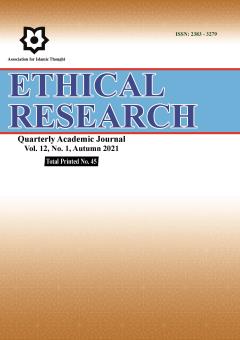Criteria of human ethical decision making of managers in conditions of environmental complexity (Case study, Social Security Organization)
Subject Areas : Ethical contexts of management and governmentMahnaz Sarafraz Kakhki 1 , Mohammadreza Zabihi 2 , Seyed Mahdi Alvani 3 , Mahmood Alborzi 4
1 -
2 -
3 -
4 -
Keywords: Decision making, Factors influencing decision making, Decision models, Environmental complexity, Social Security Organization.,
Abstract :
Undoubtedly, the most sensitive activity that managers do in any organization is decision making. But today's world is so complex and chaotic that decision-making struggles with so many problems. In complex environments, information changes rapidly and covers a wide range. The point to consider in decision making is that it is not always successful, that is, there is always the possibility of success or failure, many factors affect the ability to make decisions. In today's complex world, decision-making has become a challenge for managers. The number of decision criteria, the variety of criteria and types of quantitative and qualitative decision-making methods and the need to consider them simultaneously, the importance of the effects and consequences of the decision and factors such as it add to the complexity of decisions. Regarding the criteria of human moral decision-making, it should be mentioned that the method of decision-making in the Islamic system is contingent and participatory, and the basis in this system is the important principle of "passion". The mentioned cases are more prominent among the managers of service organizations who are faced with a large volume of clients and as a result of immediate and instantaneous decisions, because the decision-making time is very short for them and it is possible to examine a variety of options. It fades in the traditional way. One of these very sensitive and concerned organizations is the Social Security Organization. Therefore, in order to analyze the factors affecting decision making, the present study examines the decision and its characteristics, decision models. Then, with the help of content analysis, the indicators and characteristics of each decision model are extracted. Finally, with the help of a panel of experts consisting of thinkers and managers of the Social Security Organization, and then identify the various factors affecting decision-making in this organization and factors affecting decision-making in various decision-making models according to the environmental complexity of the organization. have became.
احمدی، مصطفی(1386). تصمیم گیری، رویکردها و تکنیک ها. دوماهنامه توسعه انسانی پلیس، سال چهارم، شماره11، 29-9.
اکرامی، محمود، رهبر آبکنار، ناهید و شیرنژاد، رقیه(1389). ارزیابی مشارکت کارکنان در تصمیم گیری مدیران. دوفصلنامه فرایند مدیریت و توسعه، شماره 74، صص 81 الی 95.
الوانی، سیدمهدی(1391). تصمیم گیری و تعیین خط مشی دولتی. تهران: انتشارات سمت.
ایمانی پور، نرگس(1393). متن درس الکترونیکی الگو های تصميم گيری كار آفرينان. دانشگاه تهران، مرکز آموزش های الکترونیکی، دانشکده کارآفرینی، سامانه آموزش الکترونیکی http://mec.ut.ac.ir/ . بازیابی شده در 21 شهریور 1394.
بهرامی، فاطمه(1392). بررسی رابطه متغیرهای جمعیت شناختی، ذهن آگاهی و باورهای فراشناختی با سبک های عمومی تصمیم گیری بین مدیران دانشگاه صنعتی مالک اشتر، موسسه آموزشی و تحقیقاتی صنایع دفاعی.
حسینی، سیدحسین(1385). بحران چیست و چگونه تعریف می شود. فصلنامه امنیت، شماره 1و 2، صص 51-7.
حکیمی پور، ابولقاسم(1377). تصمیم گیر ی در مدیریت : کاربرد زنجیره های مارکوف در تصمیم گیری مدیریت. مشهد: انتشارات آستان قدس رضوی.
رزقی رستمی، علیرضا(1388). فرایند تصمیم گیری و تجزیه و تحلیل مشکل. تهران: انتشارات یکان.
سعادت، اسفندیار(1372). فرایند تصمیم گیری در سازمان. تهران: انتشارات دانشگاه تهران.
سیاهکل رودی، مژگان و همکاران، (1394)شناسايي عوامل تأثيرگذار بر تصميم گيري اخلاقي مديران دانشگاه پيام نور، مدیریت دولتی ،دوره 7، شماره3.
شفیعی ، عباس،( 1377)، مقايسه توصيفى نظام هاى مديريت سازمانى با نظام مديريت اسلامى،ماهنامه معرفت، شماره 27.
شیخی نژاد، فاطمه(1387). مروری بر مدل های تصمیم گیری. عصر مدیریت، سال دوم، شماره هفتم، صص 55-50.
طباطبایی، شیما، محسن ضیایی، سیدامیر، سیم فروش، ناصر(1394). بررسی اهمیت و چارچوب مناسب آینده نگاري توسعه هدفمند آموزش پزشکی تخصصی و فوق تخصصی در کشور. طب و تزکیه، دوره24، شماره4، 102-91.
علیزاده، عزیز و منزوی، مسعود(1389). نقش علوم اعصاب شناختی در ارتش آینده. تهران: مرکز آینده پژوهی علوم و فناوری دفاعی مؤسسه آموزشی و تحقیقاتی صنایع دفاعی.
عبیری، غلامحسین(1386). نظام های تصمیم گیری و عوامل تعیین کننده. ماهنامه بانک و اقتصاد، شماره 87، صص 63- 58.
مشهدی حاجی علی، فاطمه، رفیعی، مجتبی، علیمیری، مصطفی(1392). الگوی تصمیم گیری شرکت های کوچک و متوسط دانش بنیان در شرایط پیچیده و عدم قطعیت عمیق. مدیریت نوآوری، سال دوم، شماره2، 140-113.
ماکوئی، احمد(1382). مقدمه ای بر پیچیدگی. مجله مدیرساز، شماره 14، صص 31-18.
مومنی، منصور و اسماعیلیان، مجید(1385). کاربرد شبیه سازی در عدم اطمینان فرایند تصمیم گیری چندمعیاره (MCDM). فصلنامه مدرس علوم انسانی، دوره 10، شماره 4، صص 251-231.
مهدوی، عبدالمحمد(1381). جستجوی اسناد پیچیده برای تصمیم گیری. تحول اداری، شماره 35 و 36، صص 140-131.
ناظمی، امیر، اشرافی، مژده، آزمندیان، مهدیه(1395). راهنمای شکل گیری و اجرای پانل های تخصصی. دبیرخانه آینده نگاری ملی.
ولیونوند زمانی، حسین، لونی، محمدرضا و ملکی، غلامرضا(1391). تصمیم سازی و تصمیم گیری در محیط های نظامی. تهران: انتشارات دانشکده فرماندهی و ستاد ارتش جمهوری اسلامی ایران.
Chen, Shuwei, Liu, Jun, Wang, Hui& Augusto, Juan Carlos(2012). Ordering based decision making – A survey. Information Fusion, 14, PP 521- 531.
Chettiparamb, Angelique(2014). Complexity theory and planning: Examining ‘fractals’ for organising policy domains in planning practice. Planning Theory, Vol. 13(1), PP 5- 25.
Comes, Tina, Wijngaards, Niek& Van de Walle, Bartel(2014). Exploring the future: Runtime scenario selection for complex and time-bound decisions. Technological Forecasting & Social Change,Vol.97,PP29-46.
Keast, Sarah& Towler, Michial(2009). Rational Decision-making for Managers An Introduction. John Wiely and Sons. Ltd., Publication.
McDermott, Tom, Rouse, William, Goodman, Seymour& Loper, Margaret(2013). Multi-level Modeling of Complex Socio-Technical Systems. Procedia Computer Science, No. 16, PP 1132 – 1141
O’Brien, Jamie(2014). Shaping Knowledge: Complex Socio-Spatial Modelling for Adaptive Organizations A volume in Chandos Information Professional Series. Elsevier Science, Available from www.sciencedirect.com. Available online 29 October 2014..
Radcliffe, D.M. (2011). Training Ethical Decision Makers. Available in:
http://cornellhrreview.org.
Sato, Tomoichi(2014). Risk-based project value – the definition and applications to decision making. 27th IPMA World Congress, Procedia - Social and Behavioral Sciences ,119 PP 152 – 161


